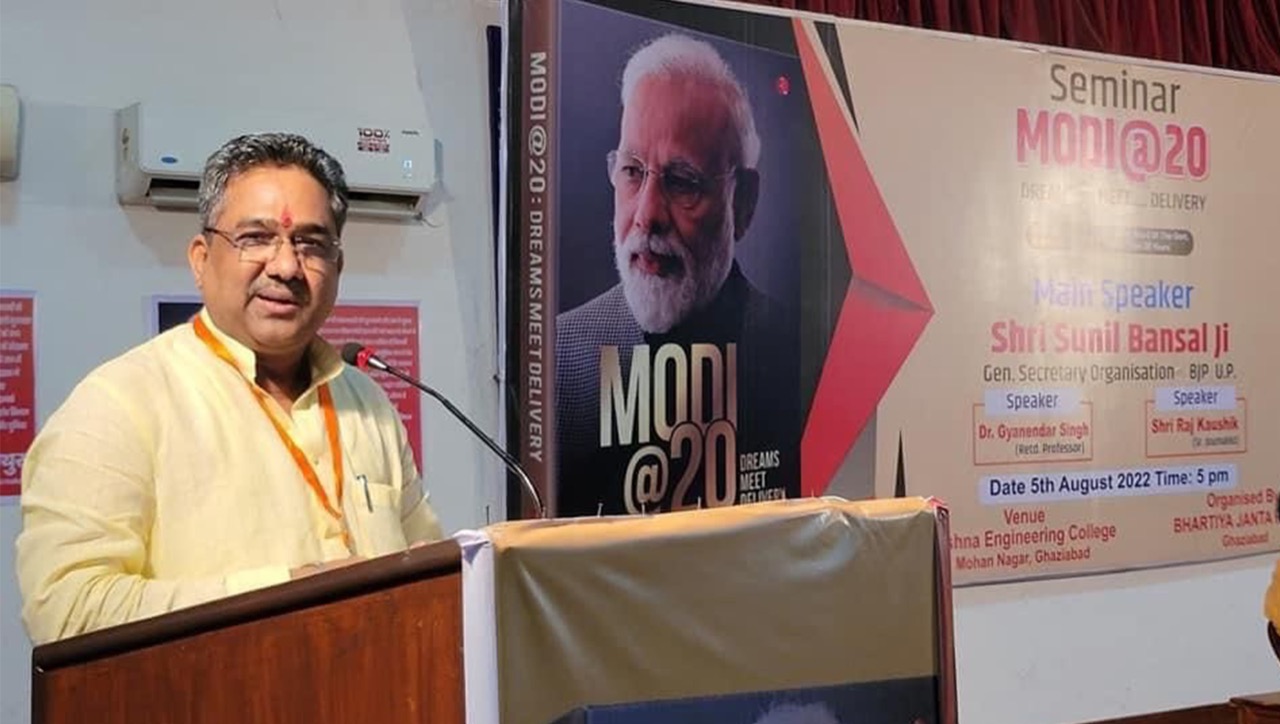NEW DELHI: When Union Home Minister Amit Shah moved to Uttar Pradesh in June 2013 as the Bharatiya Janata Party (BJP)’s general secretary in charge of the state, he knew it wouldn’t be easy to turn around the fortunes of the party in the state.
The BJP was out of power in the state for over a decade and its organisational structure was in shambles. The party has 10 members in the Lok Sabha and 47 members in the state assembly. The cadre was demotivated and the organisation was scattered.
Shah knew it wouldn’t be easy to contest elections and emerge victorious in such circumstances.He was looking for somebody who could help him with fixing the loopholes and put the organisation back on its feet. He desired someone who could sharpen his understanding of the caste complexities of the state that sends the most MPs to the Lok Sabha, 80.
Shah’s search ended when he found Rajasthan-born Akhil Bharatiya Vidyarthi Parishad (ABVP) activist Sunil Bansal. Born in Rajasthan in 1969, Bansal was associated with the Rashtriya Swayamsevak Sangh (RSS) at a very young age.
From day one, Bansal got going. He cracked the whips and began providing crucial information to Shah. In just about nine months, they changed the fortunes of the party in the state. The BJP won 71 of the 80 Lok Sabha seats in the state, with its ally Apna Dal bringing in another two seats. The BSP, a strong player in state politics, was reduced to zero seats and the Congress was reduced to two seats. The BJP won a majority on its own, and Narendra Modi took oath as Prime Minister.
But the task was not finished yet. The party had only 47 members in the assembly, and elections were two and a half years away. Shah was in Delhi, and he needed someone who could be trusted with this responsibility.
A BJP MP from Uttar Pradesh told The New Indian, “Amit Shah doesn’t trust someone easily, but once he trusts, he gives responsibility and freedom to work.” So ‘Shah’s man’ Bansal remained in the state and started fine-tuning the party machinery in the state.
BHU political science professor Kaushal Kishor Mishra told The New Indian that starting in late 2013, Bansal became a centre in the party organisation. “When he came to the state, the BJP was very disorganised. The cadre was there, but it was very demoralised and demotivated. But now, when Bansal is leaving Uttar Pradesh, the party is standing rock solid in the state,” he said.
On Wednesday, Bansal was promoted as the party’s national general secretary in charge of West Bengal, Telangana and Odisha.
A BJP leader who had worked closely with Bansal in Lucknow told The New Indian, “There is a perception that he is a tough guy. I’ll say he is a very disciplined guy and loves discipline in the organisation. If something has been decided to be implemented, he hates any leniency in it.”
By January 2017, when the party was in the poll mode for assembly elections in the state, it not only had the charisma of PM Modi but also a party structure that was standing rock solid at every booth.
The results of the assembly elections surpassed everyone’s expectations. The party had won 312 seats on its own, of the 403 seats in the assembly.
The Lucknow leader, quoted above, said, “This would not have been possible without Bansal bhai inducing discipline in every party worker.”
Slowly, Bansal became a power centre in Lucknow, creating an impression that much was happening in the state only after his approval. Rumour mills were churning that there is some friction between Chief minister Yogi Adityanath and Bansal.
The leader quoted above said, “Yes, this perception was gaining ground. Some people with vested interests fuelled it. You should know, by its very nature, that the general secretary (organisation) is a bridge between the party and the government. The person who occupies that chair has to do a very fine balancing act between the government and the party cadre. It’s not friction.”
Also, Bansal’s elevation comes at a time when a party has just faced a setback in the politically crucial state of Bihar. Its alliance with the JD (U) snapped.
Prof Mishra told The New Indian, “All the three states, West Bengal, Odisha and Telangana, are high on the BJP’s priority, not only for 2014 but also beyond. And in Uttar Pradesh, Bansal had made the impossible possible.So, you can say he is the right choice.”
The BJP won 18 of the 42 seats in the 2019 polls and became the principal opposition party after the 2021 assembly polls. After massive post-poll violence in the state after the polls, the party cadre felt abandoned and demoralised. The BJP hopes Bansal will repeat Uttar Pradesh’s magic in West Bengal, Telangana and Odisha.









